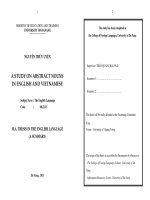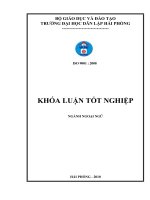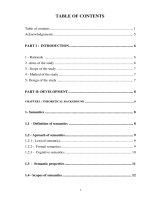A study on syllabus stress in english
Bạn đang xem bản rút gọn của tài liệu. Xem và tải ngay bản đầy đủ của tài liệu tại đây (511.99 KB, 57 trang )
1
Haiphong private university
Department of foreign languages
Graduation paper
A study on syllable stress in english
By:
Ng« ThÞ Bóp
Class:
NA904
Supervisor:
Nguyễn Thị Thuý Thu., M.A
Hai phong – June 2009
2
Bộ giáo dục và đào tạo
tr-ờng đại học dân lập hải phòng
Nhiệm vụ đề tài tốt nghiệp
Sinh viên: Mã số:
Lớp: Ngành:
Tên đề tài:
3
Nhiệm vụ đề tài
1. Nội dung và các yêu cầu cần giải quyết trong nhiệm vụ đề tài tốt nghiệp
(Về lý luận, thực tiễn, các số liệu cần tính toán, và các bản vẽ)
2. Các tài liệu, số liệu cần thiết để thiết kế, tính toán
3. Địa điểm thực tập tốt nghiệp
4
Cán bộ h-ớng dẫn đề tài tốt nghiệp
Ng-ời h-ớng dẫn thứ nhất:
Họ và tên:
Học hàm, học vị:
Cơ quan công tác:
Nội dung h-ớng dẫn:
Ng-ời h-ớng dẫn thứ hai:
Họ và tên:
Học hàm, học vị:
Cơ quan công tác:
Nội dung h-ớng dẫn:
Đề tài tốt nghiệp đ-ợc giao ngày tháng năm 2009
Yêu cầu phải hoàn thành xong tr-ớc ngày tháng năm 2009
Đã nhận nhiệm vụ ĐTTN Đã giao nhiệm vụ Đ.T.T.N
Sinh viên Ng-ời h-ớng dẫn
Hải Phòng, ngày tháng năm 2009
Hiệu tr-ởng
5
Gs.ts.ng-t: trần Hữu Nghị
Phần nhận xét tóm tắt của cán bộ h-ớng dẫn
1. Tinh thần thái độ của sinh viên trong quá trình làm đề tài tốt
nghiệp:
Đánh giá chất l-ợng của .T.T.N (so với nội dung yêu cầu đã đề ra
trong nhiệm vụ Đ.T. T. N trên các mặt lý luận, thực tiễn, tính
toán số liệu)
2. Cho điểm của cán bộ h-ớng dẫn ghi cả số và chữ)
6
Hải Phòng, ngày tháng năm 2009
Cán bộ h-ớng dẫn
(Ký và ghi rõ họ tên)
Nhận xét đánh giá
của ng-ời chấm phản biện đề tài tốt nghiệp
1. Đánh giá chất l-ợng đề tài tốt nghiệp về các mặt thu thập và phân tích tài
liệu, số liệu ban đầu, giá trị lí luận và thực tiễn của đề tài.
2. Cho điểm của ng-ời chấm phản biện:
(Điểm ghi bằng số và chữ)
Ngàytháng năm 2009
Ng-ời chấm phản biện
7
ACKNOWLEDGEMENT
First of all, I would like to express my sincere and special gratitude to my
supervisor, Mrs. Nguyen Thuy Thu, M.A, for her valuable suggestions,
comments, correction and encouragement, without which this research would
not has been comprehensive.
Besides, I also want to send my deep thanks to Mrs. Tran Thi Ngoc Lien, the
Dean of Foreign Language Department and all teachers at Hai Phong Private
University for their previous lectures that provided me good background to do
my graduation paper.
Finally, my wholehearted thanks are presented to my family and all my friends
for their constant supports and encouragement in the process of doing this paper.
Without their help, my research would not have been made possible.
Haiphong, June 2009
Ngo Thi Bup
8
TABLE OF CONTENT
Page
Acknowledgement
Part I. INTRODUCTION 1
1. Rationale 1
2. Aims of the study 1
3. Methodology 2
4. Scope of the study 2
5. Design of the study 2
Part II. DEVELOPMENT 3
Chapter 1. Theoretical background 3
I. An over view of English syllables 3
I.1. What is the syllable? 3
I.2. The structure of English syllable 4
I.3. Strong and weak syllables 7
II. Stress 7
II.1. What is stress? 7
II.2. The nature of stress 8
II.3. Levels of stress 10
II.4. Suprasegmental phonology 10
II.5. Rhythm 11
III. English syllable stress 11
Chapter 2: A study on English syllable stress 12
I. Stable stress 12
I.1. Stress placements 12
I.1.1. Initial 12
I.1.2. Second 19
I.1.3. Third 22
I.1.4. Antepenultimate 22
9
I.1.5. Penultimate 24
I.1.6. Ultimate 24
I.2. Suffixes that do not affect stress placement 29
I.3. Prefixes that do not affect stress placement 31
I.4. Suffixes carrying primary stress themselves 32
I.5. Stress that do not change by part of speech 33
II. Moving stress 34
II.1. Stress that change by part of speech 34
II.2. Suffixes that influence stress in the stem 35
II.3. Stress placement within compound words 37
II.3.1. On the first element 37
II.3.2. On the second element 39
Chapter 3: Stress errors made by Vietnamese students, reasons and some
implications 41
I. Findings 41
II. Reasons 42
III. Some implications 44
Part III: Conclusion 47
I. Summary of the study 47
II. Suggestions for further study 47
10
Part one: Introduction
1. Rationale
Nowadays, English is considered as a global language because it is the main
language used in transactions. I am also a student of Foreign Language
Department so English is very important for me to have a good job after
graduating.
However, when learning English as the second language, many students and
I found that we have to face with many difficulties. We are afraid of
communicating with foreigners because we find it is difficult to understand
every single word they said. While listening, I can realize simple words
( including 1 or 2 syllables), but it is difficult to realize complicated words
( including 3 or 4 syllables). My teacher said that when foreigners pronounce
a word, they often stress on the important words only. And this is the main
reason why we couldn‟t realize the unimportant ones. So, I have decided to
choose “Syllable stress” to do research so that I can understand more what
they said and also improve my skills.
Moreover, my teacher also said that my English speaking skill is not good
because I put stress at any syllable and my sentences don‟t have intonation
rising and falling. It has influence on expressing my thoughts while
communicating.
Studying English for some years, and according to the fact I found that not
only me but also many non- native speakers have met difficulties with
syllable stress. My friends also have the same mistakes; they put
inappropriate syllable stress position. I hope that my study will help them
predict syllable stress placement more easily.
2. Aims of the study
The study aims at:
- identifying the stress placement
- giving the understanding on stable stress and moving stress
11
- showing some findings about stress errors of Vietnamese students,
reasons and some implications.
3. Methodology
From the first year to the fourth year, this is the time when I myself gather
the knowledge about syllable stress for my research. Beside the basic
knowledge, I collect more data from reference books, websites, dictionaries,
and then I analyze and divide them into groups with the same rules.
Moreover, asking my teachers and friends whatever related to syllable stress
which they faced during learning English.
4. Scope of study
Stress is a large part, including stress in one word and stress in one sentence.
Because of my limited knowledge and time, in this paper, I will focus on
Syllable Stress ( as same as Stress in one word) containing stress in simple
words (stable stress, moving stress), and stress in compound words and some
findings about stress errors, reasons and some implications.
5. Design of the study
This graduation paper consists of three main parts:
Part one is the Introduction which states the rationale, the aims, the methods,
the scope and the design of the study.
Part two is the Development with three Chapters:
Chapter 1 is called “ Theoretical background” which includes An over
view of English syllable, Stress and English syllable stress.
Chapter 2 is named “ A study on English syllable stress” which focuses on
stable stress and moving stress.
Chapter 3 shows some findings of stress errors, reasons and some
implications.
Part three is the Conclusion restates the knowledge mentioned in Part two,
also gives a summary of the study.









